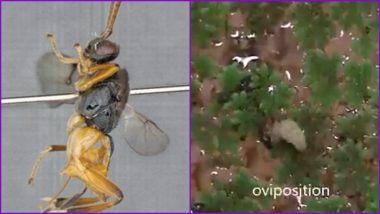There's a new discovery of a parasitic critter from Japan called the 'Godzilla wasp.' And while the name may sound monstrous, it has been called so after watching its ability to swim underwater and attack on its prey, the underwater caterpillars. In a first-of-a-kind sight, scientists have captured the wasp going underwater to attack its prey. There are very few species of wasp that can turn aquatic which makes this find an interesting one. Details of this unsual parasitic wasp have been published in the the Journal of Hymenoptera Research. Let us understand more about this newly discovered critter. But don't worry, they are not as dangerous as the murder hornets.
Dr. Jose Fernandez-Triana of the Canadian National Collection of Insects and his team found this parasite during their research. They observed that this wasp could dive in water for a few seconds, attack on the underwater caterpillar larvae and forces it out of the shell. Once the caterpillar is out, the wasp then lays its own eggs on the body of its unsuspecting prey. These eggs stay latched on the caterpillar and use it as their food source, devouring it as hey eventually grow! Wasps are not keen of water and there are only two known species that are aquatic. Wasp That Converts Spiders Into Zombies Discovered! Know About This Dangerous Parasite.
Here's a Video of the 'Godzilla Wasp' Attacking a Caterpillar:
Because of their ability to dive in water in search for its unsuspecting prey, it has been named Microgaster Godzilla scientifically. Talking about the name Dr. Jose said it reminded them of the Japanese fiction series icon Godzilla, the monster that emerges from the water. "We had biological, behavioral and cultural reasons to justify our choice of a name," Fernandez-Triana said in a statement. Although humans have nothing to worry about these species as they do not attack or sting any humans.
(The above story first appeared on LatestLY on Nov 07, 2020 02:25 PM IST. For more news and updates on politics, world, sports, entertainment and lifestyle, log on to our website latestly.com).













 Quickly
Quickly






















